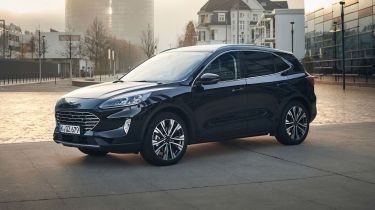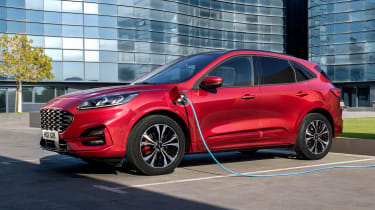New 2020 Ford Kuga hybrid: prices, details and specs
Prices and efficiency figures have been announced for the Ford Kuga, with mild-hybrid, full-hybrid and plug-in-hybrid technology all offered
Ford has announced full pricing and specification details of the non-plug-in, full-hybrid version of its Kuga family SUV, which will start from £33,600 in the UK. This completes the three-strong line-up of electrified Kugas on sale here, alongside the mild-hybrid and plug-in hybrid versions of the car.
The Kuga Hybrid – in similar fashion to Toyota and Lexus hybrids – uses a 2.5-litre engine working in conjunction with an electric motor, fed by a small 1.1kWh battery, so pure-electric running is limited to short distances at lower speeds. It has a power output of 187bhp and returns close to 50mpg, with CO2 emissions of 130g/km.
Ford says the Hybrid's total driving range is 30% greater than that of the Plug-In Hybrid version (detailed below), making it a better option for those who regularly cover long distances and may previously have favoured diesel power. It also has a 0-62mph time of 9.1 seconds, a towing capacity of 1,600kg and 1,481 litres of boot space when the rear seats are folded down.
Kuga Plug-In Hybrid
The Kuga Plug-In Hybrid combines a 2.5-litre petrol engine with an electric motor to produce 222bhp, while its 14.4kWh battery should return up to 35 miles of electric range. The charging port is mounted at the front, with Ford claiming a four-hour charge time.
Official fuel economy stands at 202mpg and CO2 emissions are 32g/km. Drivers have the choice of four modes – EV Auto, EV Now, EV Later and EV Charge – giving them control of how and when the battery power is used.
Kuga EcoBlue mild hybrid
The Kuga EcoBlue Hybrid (Ford's name for the mild-hybrid version) combines a 2.0-litre, 148bhp diesel engine with a starter-generator, allowing energy to be recovered and stored in a small battery pack. It also provides assistance to the engine – aiding acceleration – and helps run the car’s electrical components. The EcoBlue Hybrid achieves 55mpg and emits 135g/km of CO2.
Specifications
The Kuga is offered in entry-level Titanium, sporty ST-Line and luxury Vignale trims. The former features a front skid plate and rear diffuser, with LED running lights and 17-inch alloy wheels as standard. A set of 19-inch alloys is available as an option.
The ST-Line trim adds body-coloured bumpers and side skirts, with the grille, front skid plate and rear diffuser finished in black. A large spoiler, twin exhausts and 18-inch alloys (a 19-inch upgrade is available) complete the exterior look, while the interior gains exclusive ST-Line seats and floor mats, contrasting red stitching, alloy pedals and a flat-bottomed steering wheel.
Elsewhere, the Vignale trim adds ‘satin aluminium finishes’ on the roof rails and bumpers, with the grille and twin tailpipes finished in chrome. Alloy wheel size is 18 inches as standard, with 19 or 20-inch wheels available as an option. Windsor leather seats feature inside, with a leather-wrapped steering wheel and premium velour floor mats included, too.
Infotainment and connectivity
The Kuga benefits from a suite of technology: drivers get a 12.3-inch digital instrument cluster and a head-up display, with Ford’s SYNC 3 infotainment system running on an eight-inch central touchscreen. Apple CarPlay and Android Auto smartphone connectivity are included as standard across the range, with wireless charging and a premium B&O Sound System available as well.
The FordPass Connect acts as an on-board wi-fi hotspot, giving connectivity to as many as 10 devices at a time, in addition to live traffic updates. Meanwhile, the FordPass app allows drivers to locate their vehicle, check fuel levels, unlock doors and start their car remotely.
Automatic safety aids include lane-keeping assistance, blind-spot monitoring and pre-collision assistance, along with adaptive cruise control, traffic-sign recognition and stop-go functionality. Ford’s Active Park Assist 2 provides fully automated parking at the push of a button.

